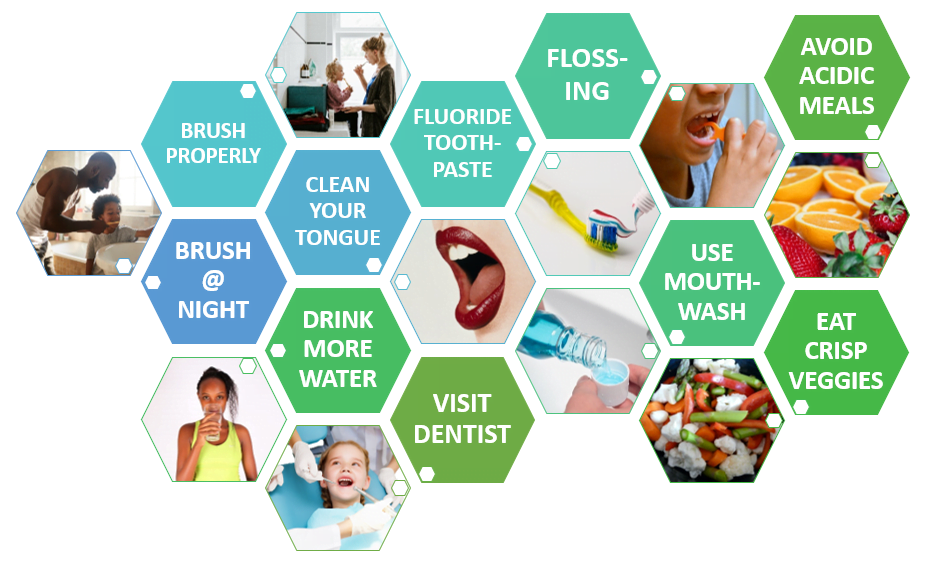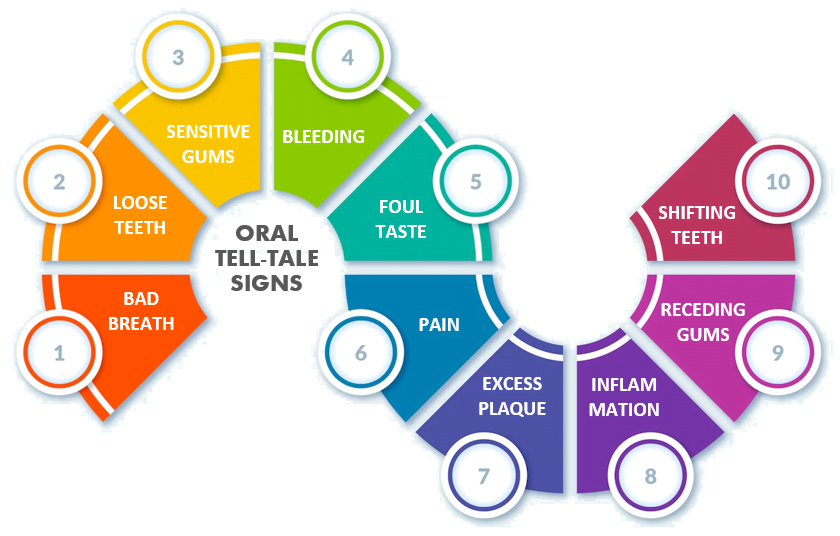Healthy teeth and excellent hygiene are frequently evident in a mouth with healthy gums, strong teeth, neutral breath, and a clean tongue. Additionally, keeping your teeth healthy avoids the onset of numerous illnesses and conditions that can affect the mouth. One of the first sites for many diseases, including diabetes, to exhibit symptoms is the mouth.
One of the initial signs of many blood-related diseases is bleeding gums. Periodontitis, an illness that affects the gums and bone around the teeth, is frequently identified in conjunction with a number of heart diseases.
How important dental hygiene is
Good dental hygiene is intimately tied to health. In addition to helping to avoid oral diseases like tooth decay and gum disease, maintaining excellent oral health also indirectly helps to prevent diabetes, heart disease, and a host of other health issues.
How to keep your teeth healthy and strong?
Maintaining appropriate oral hygiene practices and keeping your teeth healthy are essential to maintaining good health and preventing the onset of diseases.

1. Brush thoroughly
The way you wash your teeth is equally important; in fact, cleaning your teeth improperly is almost as bad as not brushing at all. Take your time and remove plaque by brushing in gentle, circular motions. Unremoved plaque can harden and result in calculus.
Ineffective and infrequent tooth cleaning can lead to plaque buildup and eventually gum disease. The most serious type of gum disease causes irreversible tooth decay caused by oral bacteria, which leads to tooth loss.
2. Brush your teeth before going to bed
Diabetes, cardiovascular disease, and issues with pregnancy, particularly those that lead to premature delivery, are the most frequent conditions that seem to be directly connected to significant gum infections. Gum disease is more difficult to treat in those with diabetes, which increases the risk of getting the illness.
It should go without saying that you should brush your teeth at least twice a day. On the other hand, brushing your teeth before night eliminates plaque and bacteria that have accumulated over the day.
3. Don’t forget about your tongue
Your tongue may also develop plaque. This can lead to bad breath as well as other problems with dental health. Make sure to thoroughly brush your tongue as you brush your teeth.
Dental plaque is one of the main causes of gum disease and dental deterioration. Dental plaque contains bacteria that create acids that eat away at the enamel of teeth and eventually cause decay.
4. Make use of fluoride toothpaste
While choosing toothpaste, there are additional factors to take into account in addition to whitening effectiveness and flavor. Make sure the one you choose has fluoride in it. Fluoride is still a crucial part of oral health, despite some people’s worries about its impact on other areas of health. Fluoride’s strong anti-cavity qualities are to blame for this. It works by battling bacteria that cause tooth decay and serving as a barrier to safeguard.
Dental plaque is a bacterial encrustation that naturally forms on teeth, gums, and other oral surfaces. It starts off as a translucent, gooey deposit that thickens and eventually turns yellow or brown.
5. Flossing once a day
Problems with flossing shouldn’t stop you. Particularly for young children and older persons with arthritis, flossing can be difficult. Instead of giving up, search for methods that make flossing your teeth easier. Drugstore dental flossers that are pre-packaged may be useful.
6. Consider using mouthwash
Mouthwash is frequently avoided because people don’t understand how it works, despite the fact that advertisements make it seem essential for maintaining good oral health. Schwartz claims that mouthwash can help in three different ways. It restores minerals to the teeth while cleaning hard-to-reach areas in and around the gums and neutralizing oral acid. Ask your dentist for advice on specific mouthwash brands. Children and others with sensitive teeth are advised to use specific products. Additionally, mouthwash on prescription is accessible.
7. Increase your water consumption
The most healthy beverage for your overall health, including your oral health, is water. As a general rule, Schwartz advises drinking water after every meal. This can assist in mitigating some of the negative effects of sticky and acidic foods and beverages in between brushing.
8. Consume crunchy veggies
Even while ready-to-eat meals are convenient, they could harm your teeth. Fresh, crisp vegetables are the greatest for your teeth since they contain more fiber and are also higher in fiber.
9. Limit your intake of sugary and acidic meals
In the mouth, sugar eventually turns into acid, which can destroy tooth enamel. These acids result in cavities. Coffee, citrus fruits, and acidic beverages can all erode teeth enamel. Even while you don’t have to fully avoid certain meals, it never hurts to be aware.
10. Visit your dentist at least twice a year
Your daily routine is crucial to maintaining good oral health. Even the most conscientious brushers and flossers need to go to the dentist frequently. A dentist can spot potential issues and provide appropriate treatments in addition to removing calculus and checking for cavities. Even more regular dental exams may be covered by some dental insurance carriers. Use this to your advantage if it pertains to you. This is especially true if you have a history of cavities or other oral problems like gingivitis.
Children and adults should visit a dentist for a cleaning and oral checkup every six months, according to the American dental profession. Two checkups are often covered by dental insurance plans, and this frequency helps dental professionals to identify any problems when they are still little and easy to fix. Tatum Point Dentistry comes highly recommended if you’re looking for a dentist in Scottsdale. Typically, your dentist will advise you on how often you should visit for a checkup and cleaning. While there are a few odd exceptions, the majority of people who maintain good dental hygiene only require a biannual visit to the dentist.
If you fall into one of the following groups, your dentist could suggest more frequent cleanings and exams:
- You’re Expectant
The fluctuating hormones of pregnancy can increase a woman’s chance of developing cavities and gum disease.
- You’ve been diagnosed with cancer
Some cancer medications may result in dry mouth and raise the possibility of oral health issues.
- You Have Diabetes
Diabetes can exacerbate oral health problems including gum disease.
- You’re a Cigarette Smoker
Smoking can worsen gum disease and make it more difficult for your body to recover after oral surgery and dental procedures.
Telltale Signs & Symptoms of Oral Problems

One of the most well-known signs that a patient is having oral health problems is a toothache. This might be a sign of gum disease in its early stages, oral caries, physical harm to the mouth, or both.
Frequently bleeding or painful gums are a sign of a greater problem, such gingivitis. Mouth sores, which can appear as a result of bacterial overgrowth in the mouth or viral infections, are another dental symptom. Persistent foul breath is another typical oral health symptom that may be a sign of gum disease.
Use saliva as a diagnostic tool
A trusted diagnostic method that is often used is salivary gland-produced lubricating and digestive-assisting fluid. Even while saliva comprises 99.5% water, it also has other compounds, such as growth factors, antibodies, enzymes, and hormones, that help it function as a diagnostic fluid. Numerous oral and systemic conditions, including cystic fibrosis, HIV, diabetes, and oral cancer, can benefit from its proper identification. Additionally, it is routinely used to check for drug usage.
Saliva has characteristics that help wounds heal and can prevent certain infections. Actually, it acts as one of the body’s main defenses against harmful microbes. Saliva maintains the mouth’s alkaline pH, which stops many germs from flourishing there. Due to the calcium and phosphate ions in saliva, it also helps to cure small enamel flaws.
Histadins, which are found in saliva, prevent the growth of the harmful fungus that naturally exists and causes oral thrush.
Conclusion
Germs and harmful bacteria thrive in the warm, moist environment that your mouth cavity offers. More than 500 distinct species of bacteria are present in the mouth at any given moment. Without adequate care, the mouth cavity may possibly become home to a number of viral, protozoal, and fungal species. So, it is important to keep your teeth healthy and strong.
- Brush your teeth twice daily with fluoride toothpaste, and floss or small brushes can be used every day to clean in between your teeth.
- Drink fluoridated tap water. According to a 2014 survey by the National Health and Medical Research Council, people who drank fluoridated water had a 26-44% decrease in tooth decay.
- Use a mouth guard when playing sports since oral injuries can cause discomfort and tooth loss.
- Avoid smoking because it causes gum disease and oral cancer.
- Reduce your sugar intake. Bacteria use sugars to produce the acids that cause deterioration. Rinse your mouth out with water after eating or drinking anything sweet or acidic.



